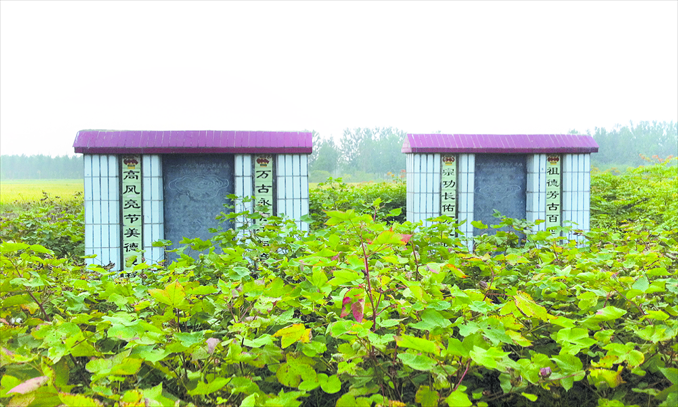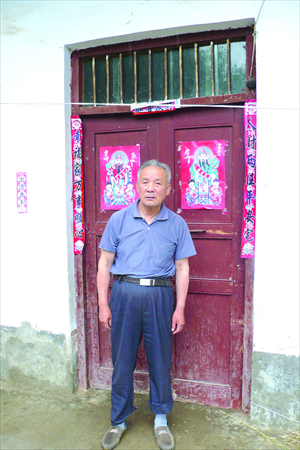Starved of memories

In a cotton field near a village in Henan Province, two elegantly decorated monuments bear 72 names of villagers who starved to death over five decades ago. Their deaths were likely the tragic result of misguided thinking, instead of the claimed "natural disasters."
China is in dire need of recording the dark chapters of its modern history. This is never more true than for a disaster which claimed at least 10 million lives in just three years. A farmer in Henan has taken the first step. As a survivor who almost starved to death twice, he set up two memorials for the dead villagers in 2004, considered to be the first of their kind.
This pioneer's name is Wu Yongkuan, 69, from Wuweizi village, Guangshan county. Located in the southeast of Henan, the area is well-known for its fertile soil and high crop yields.

Wu feels he was lucky to be among the 55 villagers who lived through what he calls the "crazy days," referring to a period of four months from late 1959 to early 1960. A total of 73 other villagers were not so lucky as they either starved or were beaten to death.
In that period, the county alone numbered over 140,000 dead, the Southern People Weekly reported in May. At least 1 million people died across Xinyang, accounting for half of Henan's death toll.
"Xinyang's situation was the worst in Henan and our county's was the worst in Xinyang," said Wu.
This disastrous time ranged from 1959 to 1961, described widely as the "three years of natural disasters." Although Wu's village suffered no natural disasters and the villagers reaped a good harvest, they had nothing to eat. This was down to a movement born in 1958, the Great Leap Forward (1958-61).
Seeking to build a rapid base for socialism, the Great Leap Forward required the lightning development of industry and agriculture, usually outside the limits of the country's capacity.
"Officials didn't care about the real situation. They were all exaggerating the truth, from county-level officials to village heads," Wu said, adding that the grain production boasted of by local officials was at least double the area's real output.
"As a result, villagers were forced to hand in all the grains they had, and therefore nothing was left for food," he said, recalling the scene that even those who hid a little crops in their shoes would be caught and beaten.
To honor their memories and remind later generations, Wu set up the memorials in his cotton field back in 2004, costing him over 3,000 yuan ($472). Carved on them are the names of the local people who died. Wu's father and uncle are among those listed.
"I have a good memory and I could recall almost all their names one by one," Wu told the Global Times in his yard. Just a 10-minute walk away, only the forgotten name of one villager is missing from the list.
Rediscovering history
Wu said the idea of building the memorials first came to him much earlier than 2004, but was postponed due to a lack of funds. He thought it up back in 1968 when he was a village official.
Wu did not tell the Global Times whether there were other reasons for the postponing, but he repeated that he was pleased to see a more tolerant government today.
"As soon as I got the chance, I vowed to build memorials for them because it was really a tragedy. The later generations should know the truth, and I want to remind people not to spread lies," recalled Wu.
Wu's daughter, 50, told the Global Times that her grandmother educated her about this period of history. "Now some young people know nothing about this at all, and in years to come, perhaps nobody will believe this ever happened if nothing is remembered," she said.
Memorials help keep alive the memories of the hardships Chinese people once endured, and are also a mark of respect for the dead, said Yang Jisheng, deputy director with Yanhuang Chunqiu, a monthly history journal. Yang worked as a reporter at the Xinhua News Agency for over 30 years and hopes to see more such memorials erected.
Yang's view was echoed by Qiao Xinsheng, a professor at Zhongnan University of Economics and Law. "Everyone is a part of history, and their names should be engraved on tombstones," he told the Global Times.
But for Zhang Ming, a professor of political science at Renmin University of China, it is tragic that such monuments were set up by an individual. "Monuments should be built by the country. These are lessons we should all learn and those poor people should be commemorated nationally," he told the Global Times, adding that the government is holding an ambiguous attitude toward this period of history.
This ambiguity can be seen in many different ways that this period of history has been named and referred to. The famine in Xinyang was later spoken of as the "Xinyang Incident" in official documents, and not as part of "three years of natural disaster" as written in textbooks.
"The government does not deny the truth, but public reflection and self-criticism have never been made, despite mistakes being admitted," said Zhang.
Sensitivity remains
The topic is a sensitive one for both Wu and Yang. Wu once regretted not submitting his idea to the local government before building the memorials himself. "It might have been better if I had sought advice from the government, but I was a bit afraid of being taken the wrong way," he said.
He now sees these concerns as unnecessary. "Those are the facts, and I'm not against the government. Only by respecting facts can State affairs be well managed," said Wu.
As for Yang, he feared facing political retribution, although this remained unfounded.
He published his book Tombstone in 2008 in Hong Kong, an account of the famine seen during the Great Leap Forward. During his research for the book, Yang spent 10 years collecting materials and visiting survivors of the starvation.
The book was meant to commemorate the dead not only in Henan but in other provinces, including Sichuan, Anhui and Shandong, on which the book focuses.
The death toll reached over 30 million nationwide, according to Yang's investigation. This figure is far higher than government estimates of over 10 million.
However, not everyone agrees that the famine was caused by the Great Leap Forward. "Some people exaggerated by saying that tens of millions starved to death, which is meant to ruin the reputation of Chairman Mao Zedong," Lin Zhibo wrote on his Weibo in May. Lin is the head of the People's Daily branch in Gansu Province. He later apologized for his lack of knowledge of this period.
Reports claim this is because the government once tried to cover up this period of history. Different statistics also contradict each other.
In Anhui Province, people who died of non-natural causes numbered over 6 million from 1958 to 1962, according to scholar Cao Shuji's findings. However, Yang Jisheng put the number at over 2 million after his investigation. Back in 1962, the official death toll for Anhui Province was 4 million.
For professor Qiao, it is China's extensive management style that has caused this trouble. He said numbers alone are not persuasive, and that people do hold different opinions toward historical facts.
"The names of the dead should be collected while survivors are still alive, and only in this way can truth be restored," said Qiao. He added that it is for historians to uncover the truth and "piece together a complete picture."
He said civilian historians are just important as official historians in restoring the truth, and what Wu did reflects the awakening of public's civil awareness.
"Recalling that history is not meant to oppose the government, but to make sure that such a tragedy won't happen again," said Qiao, adding that it can also help rethink the decision-making system and improve leaders' abilities.
System failure
What Wu experienced was a man-made disaster, caused by the old system, said Yang, who recognized that some natural disasters had taken place, but refuted that they were the main reason for the famine.
"Administrative power expanded too rapidly and it permeated into every family," Yang said, explaining that in those days, the State determined what people ate and thought, rationing food for every person.
"People even had tried to call for help or flee from the famine," he said, adding that about 12,000 letters were "captured" by the post office and public security bureau in Xinyang during the "crazy days."
The "block" was also experienced by Wu Yongkuan, whose fellow villagers would be caught and beaten by village heads when they tried to flee or kill cattle for food.
To Yang, some village heads may have already been poor choices as leaders and the power they held made them even more unscrupulous.
This was echoed by Zhang Ming. He said the Great Leap Forward showed the risks of unrestricted power. "There were no 'brakes' on the old system, and it was hard to turn things around once they spiraled out of control."
To Wu, remaining simple and not telling lies is the most important thing for people from all walks of life, no matter whether they are officials or farmers.